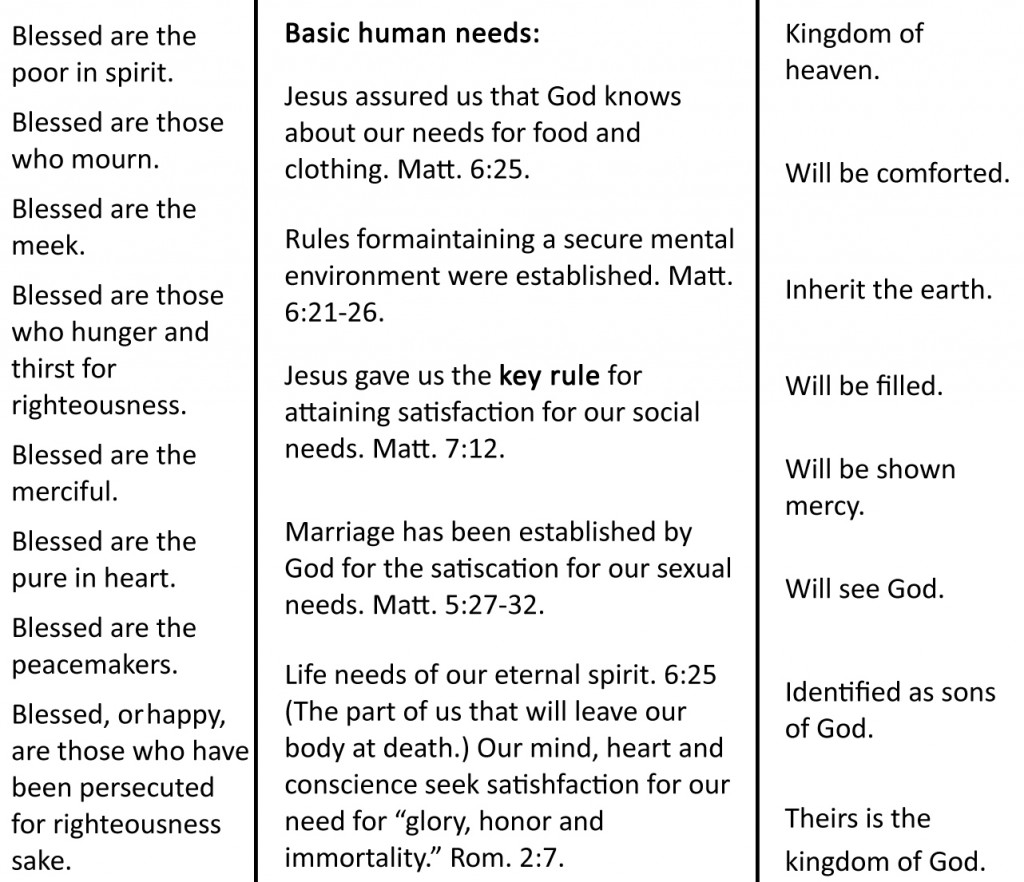Introduction – Inferiority Complexes
Thus far in the Sermon on the Mount Jesus has taught us healthy emotional attitudes. He has warned us about the pitfalls that will rob us of our power to move toward our goals with strong character. Jesus showed us the proper goals for “laying up treasures in heaven.” He has taught us how to practice our righteousness in such a way to attain the satisfaction for our innate earthly needs as well as our innate spiritual needs. Jesus assured us of the satisfaction of our physical needs by seeking God’s kingdom and His righteousness first. All of our spiritual needs may not be fully satisfied while in this life but we have hope so we are satisfied. Our rewards from God, our heavenly Father, on Judgment Day will fulfill these hopes. He has taught us how to be happy.
The following are excerpts of charts that were used in previous lessons. They may be useful for a review of the foregoing points before we enter our study of Matthew chapter seven.
The following are the terms Jesus used for the development of Christians’ worldview:
See the Introduction of Part IV
In our lessons in Part V Jesus will turn our thoughts to the people in our habitat. How do we get along with our fellow man? Sometimes people may think everything would be just great if we could go off by ourselves and live our Christian lives. Some people have pursued the life of a hermit – the holy man. Some religions have developed the monastery concept in order to produce spiritual growth for those who lead the movement. However, the innate needs God created in each individual demand a relationship with people, as well as with God in Christ.
We were all born into a family of people. We begin our lives in the state of dependency. Through many tribulations and much help from “significant others” we may have arrived at what we feel is the state of independence. Youth strive and rejoice when they can “move out on their own.” Free at last! So they think. However, the reality of human life is that mankind must accept the responsibility of living in an interdependent society.
In sports and in the business world we speak of the team. In marriage and in the church we think in terms of family (Eph. 5:32, 33). In marriage two become one and yet each partner has a specific role for which they are responsible (Matt. 19:5; Eph. 5:22-24; Col. 3:18-21). In the church, “though all its parts are many, they form one body.” I Cor. 12:12. Each individual Christian must take the responsibility for at least one part in the body of Christ (Rom. 12:4-8; Eph. 4:14-16).
Each person starts life in the dependent stage. They cannot remain there. They must “ask, seek and knock” until they enter the independent stage (Matt. 7:7). Unless they mature to the point that they take responsibility for their emotions, behavior and finances they are too immature to do well in an interdependent society.
Of course, we will always be dependent on others in some areas of our lives. We are certainly dependent on Deity. People who depend on God for things over which mankind has no control are free to use their energy for worthwhile goals. This is different from being overcome with the emotion of dependency. Physically mature adults who suffer with “passive dependency personality disorder” will not take the responsibility of thinking for themselves.
This has always been the most serious problem in the Lord’s church. It is paradoxical in nature. People who think for themselves in their mundane vocation often have a tendency to be extremely “passive dependent” in their spiritual vocation (Eph. 4:1). They tend to seek out a holy man or reverend to think for them. It is sometimes classified by the slang term “preacher-i-tis.” Paul was upset with the Corinthian brethren when they began to split the church because of this personality disorder (I Cor. 1:12). He warned Timothy about catering to people with dependency personalities in religious matters (II Tim. 4:1-5). They need to think for themselves based on their own study of God’s word (II Tim. 2:15; Rom. 10:17).
The healthy development of human personality and character demands an interdependent activity with other humans. Also, to fulfill God’s desire for Christians to be “salt and light” in the world we must learn to accept the responsibility of functioning in the interdependent state of the family; the community; the nation in which we are citizens; and the church which is the “man dimension” of the kingdom of God. Along with this, God created a need within us for friends. All people are social beings and we all want friends. Even the people who say they don’t care, still wish they had friends.
Jesus tells us how to successfully get along with people. He gave us two don’ts and two dos.
Don’t judge.
Don’t lower your standards.
Do keep trying.
Do unto others as you would have others do unto you.
He will warn us about the false prophets who go about in sheep’s clothing and the broad road that leads to destruction. The final warning strikes out at the rally type religion. The kingdom of God is not just “talk,” it is about developing powerful significant people who want to live with God eternally (I Cor. 4:20). The bottom line is this, “if we don’t know Jesus now He will not know us at Judgment.”
When Jesus had finished saying these things, the crowds were amazed at His teaching, because he taught as one who had authority, and not as their teachers of the law. Matt. 7:28, 29


